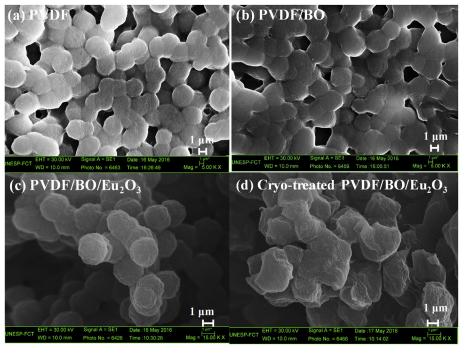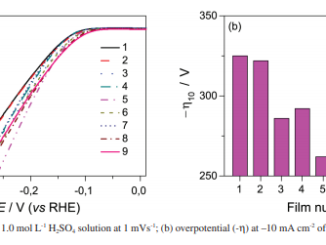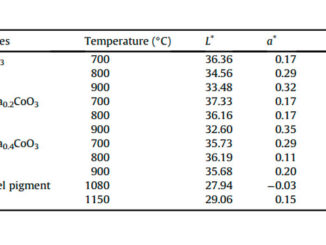
Evaluation of cryo-treatment in the luminescent properties of PVDF/Eu2O3 composite obtained by using buriti oil as additive
Abstract: Polymeric matrices containing luminescent particles find many applications like temperature sensor platforms. However, it is important to understand the impact of the particle immobilization on the polymer structural and optical properties in order to optimize its performance. Therefore, in this study, a new luminescent polymeric composite was fabricated by combining poly (vinylidene fluoride) (PVDF), buriti oil (BO) and Eu2O3 particles, evaluating the membrane luminescent properties before and after a cryo-treatment with liquid N-2 in order to enhance the Eu(III) emission. Also, the influence of Eu2O3 particles and BO in the polymer structural, thermal, morphological and optical properties was evaluated. The composite membranes with bandgap lying between 5.60 and 5.90 eV were obtained as gamma-PVDF phase after being dried at 100 degrees C, with spheroidal particles connected by necks. The PVDF membranes are very stable till temperatures as high as 370 degrees C, and the Eu2O3 particle addition increases the membrane thermal stability while the BO decreases the PVDF stability. The cryo-treatment with N-2 increases the PVDF crystallinity, leading to the PVDF particles agglomeration. The PVDF/BO/Eu2O3 membrane exhibited the characteristic red emission from Eu(III) along with an unexpected BO emission. Finally, after the cryo-treatment, the Eu3+ emission increases while the BO emission vanishes, and due to this temperature sensitivity, the system shows potential to be applied in temperature sensor platforms.
Author(s): Bispo, AG; Pires, AM; Lima, SAM; Cardoso, CX
SOLID STATE SCIENCES
Volume: 92 Pages: 24-30 Published: JUN 2019
DOI: 10.1016/j.solidstatesciences.2019.04.003




